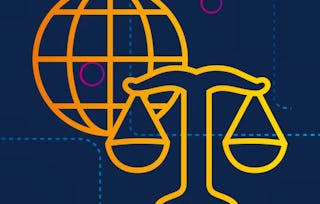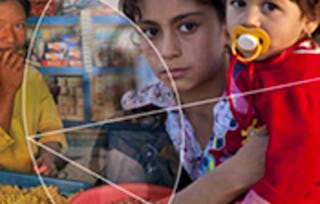This course proposes an overview of current global health challenges drawing on the insights of several academic disciplines including medicine, public health, law, economics, social sciences and humanities. This interdisciplinary approach will guide the student into seven critical topics in global health.

Global Health: An Interdisciplinary Overview

Global Health: An Interdisciplinary Overview


Instructors: Rafael Ruiz De Castañeda
30,818 already enrolled
Included with
497 reviews
Skills you'll gain
- Health Policy
- Chronic Diseases
- Intellectual Property
- Infectious Diseases
- Governance
- International Relations
- Sustainable Development
- Mental Health Diseases and Disorders
- Socioeconomics
- Environment Health And Safety
- Health Disparities
- Epidemiology
- Political Sciences
- Health Care
- Medical Science and Research
- Pharmaceuticals
- Drug Development
- Environmental Science
- Public Health
- Skills section collapsed. Showing 9 of 19 skills.
Details to know

Add to your LinkedIn profile
7 assignments
See how employees at top companies are mastering in-demand skills

There are 8 modules in this course
Welcome to Global Health: An Interdisciplinary Overview! This course consists of the course guides, including discussion forum activities and assessments, along with presentations by a range of presenters, from the University of Geneva, The Graduate Institute, WHO, UNDP, WTO, IUCN, Medicines Patent Pool, among others. You will benefit from the insights and perspectives of multiple contributors involved in global health research, teaching, policy and practice across disciplines and sectors. Your enjoyment and benefits from the course will above all depend on your participation within this course, and we very much look forward to your participation through the discussion forums. Enjoy the course!
What's included
7 videos2 readings
This module will introduce the concept of global health. Global health is a relatively new field and there is currently some debate over its definition.
What's included
4 videos3 readings1 assignment
There are 7 parts to module 3. Lessons 3 & 4 are both introductory sections that describe key concepts necessary to understand infectious diseases and how we deal with them. Lesson 5 constitutes the core lesson of module 3. This lesson focuses on the current global situation and future challenges for the most prominent infectious diseases of the world. In lessons 6-9 we discuss neglected tropical diseases, re-emerging infectious diseases and epidemics/pandemics. Finally, lesson 10 and 10b summarize module 3 in a set of key conclusions.
What's included
9 videos9 readings1 assignment
In this module we consider the rise of non-communicable (NCDs) diseases across countries, along with mental disorders and disability.
What's included
6 videos3 readings1 assignment
This module is concerned with the global health system (which refers to responses to health conditions or the prevention of these) and the management of this system through global health governance.
What's included
4 videos3 readings1 assignment
Health policy has undergone profound changes during the last few decades. Although health has for a long time been an issue in international relations, it was for most of the 20th century perceived as a national and technical matter. This meant that solutions to health problems were seen to require primarily scientific and technological collaboration rather than political commitment. Along with the dramatic changes associated with globalisation, health is increasingly seen as a higher priority on international political agendas. In Module 6, we discuss what triggered this political ‘revolution’ and its implications.
What's included
3 videos3 readings1 assignment
This module addresses the lack of attention to research and development for medicines and technologies for diseases that disproportionately affect developing countries and all the issues related to drug development and intellectual property rights.
What's included
8 videos6 readings1 assignment
In this module we consider the relationship between the environment, sustainable development and health.
What's included
6 videos4 readings1 assignment
Instructors


Offered by
Explore more from Public Health
 Status: Free Trial
Status: Free TrialImperial College London
 Status: Preview
Status: PreviewUniversity of Copenhagen
 Status: Preview
Status: PreviewThe University of Tokyo
 Status: Preview
Status: PreviewYale University
Why people choose Coursera for their career

Felipe M.

Jennifer J.

Larry W.

Chaitanya A.
Learner reviews
- 5 stars
67%
- 4 stars
23.54%
- 3 stars
6.23%
- 2 stars
1.60%
- 1 star
1.60%
Showing 3 of 497
Reviewed on Jan 26, 2025
Although I was not familiar with many topics discussed, it was a very interesting and informative course. Good job to everyone and thank you!
Reviewed on Nov 1, 2022
This was a really mind opening course to know how health transcends boundaries of medicine to have an inter-sectoral impact.
Reviewed on May 15, 2020
A wonderful course for better understanding of Global health. Slightly technical but very useful for a bigger and blurred picture learning.

Open new doors with Coursera Plus
Unlimited access to 10,000+ world-class courses, hands-on projects, and job-ready certificate programs - all included in your subscription
Advance your career with an online degree
Earn a degree from world-class universities - 100% online
Join over 3,400 global companies that choose Coursera for Business
Upskill your employees to excel in the digital economy
Frequently asked questions
To access the course materials, assignments and to earn a Certificate, you will need to purchase the Certificate experience when you enroll in a course. You can try a Free Trial instead, or apply for Financial Aid. The course may offer 'Full Course, No Certificate' instead. This option lets you see all course materials, submit required assessments, and get a final grade. This also means that you will not be able to purchase a Certificate experience.
When you purchase a Certificate you get access to all course materials, including graded assignments. Upon completing the course, your electronic Certificate will be added to your Accomplishments page - from there, you can print your Certificate or add it to your LinkedIn profile.
Yes. In select learning programs, you can apply for financial aid or a scholarship if you can’t afford the enrollment fee. If fin aid or scholarship is available for your learning program selection, you’ll find a link to apply on the description page.
More questions
Financial aid available,

